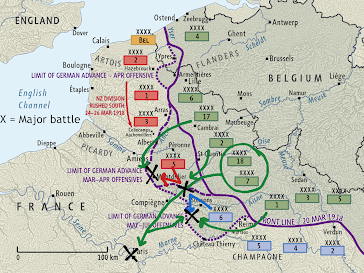If Germany Won World War I (Part 1: A World at War)
The year is early 1918, and Germany has just beaten the Russians on the eastern front after the Bolsheviks took over the current Russian government, making it communist. Germany could now focus on the Western front, and it was confident that it would win the war. Britain and France were freaking out, and the American reinforcements were far away. Welcome to World War I!
Germany needed a decisive victory before the new American troops reached the front line. Since they had a massive manpower advantage over the Allies, the German battle strategists came up with a plan to hit the Allies where they were weak. On March 27th, the German forces rammed into the French and British forces near Soissons. Without the American reinforcement, the Allied troops crumpled like a tinfoil ball. The Germans advanced toward Paris, and more troops poured through the hole in the frontline. By the time the Allies sealed the hole, it was too late, and a massive German army was already attacking Paris. The French surrendered after 20 days of siege, and it was a simple matter for the Germans to capture the routed French troops guarding the city. With the French and Russians out of the war, all that was left was Britain, and ultimately, America.
Britain desperately needed the American troops, and soon. Germany was bombing their major ports and cities, and pretty soon would launch an invasion of Britain. If they didn't get those reinforcements--and fast--they were toast. Unfortunately for the English, German U-Boats were flooding the seas and torpedoing the American transport ships, and all those troops that Britain needed were now statues in an undersea world. Soon, the invasion that both sides knew was coming came. The Germans, with their many battleships, shelled English coastal defenses relentlessly. While that was going on, the German troops were unleashed onto the British mainland. The shell-shocked English troops had no chance of warding off the Germans. The Jerries pushed up through mainland Britain and eventually reached London. The English surrendered, and France and England both fell to Germany.
Meanwhile, the rest of the world was looking on apprehensively. Germany was establishing itself as the most powerful country in the world, as well as one of the largest. Many countries were eager to assist Germany, or at least get some good relations with the country so they weren't the next ones attacked. For example, Italy supported Germany and provided men and supplies. No one knew if Germany had plans for world domination, or if they just wanted to crush their current opponents.
One such opponent was America. However, the U.S. provided a more difficult challenge for Germany, a geographical one. America and Europe were separated by the Atlantic Ocean, and crossing it might be a little difficult, especially because America probably wouldn't let the Germans cross without resistance. After much discussion in Berlin, a plan for a massive sea invasion of North America was concocted. The main invasion fleet would be protected by German destroyers and warships, as well as a fleet of German U-Boats. The invasion fleet sailed across the Atlantic, encountering little resistance until Bermuda. There they met a fleet of American warships protecting the nation with light British reinforcement from the port at Bermuda.
It was a bloodbath.

Comments
Post a Comment